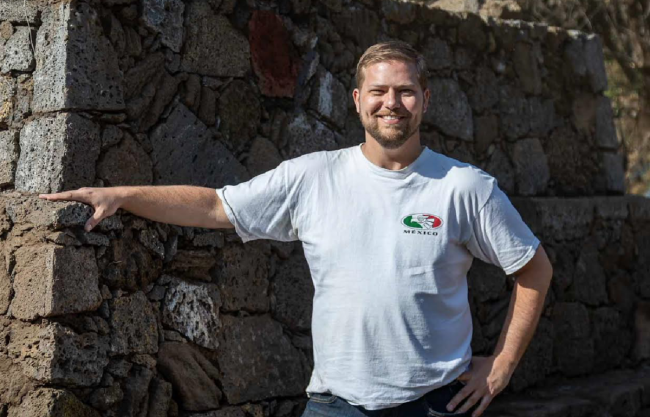You have /5 articles left.
Sign up for a free account or log in.

David Walton
David Walton
Lake-Sumter State College in Florida opposed the unionization of its full-time faculty. Then it refused to meet with the new union virtually for contract negotiations during the pandemic.
This summer, the college sent two members of the faculty bargaining team packing on the same day. One of those professors served the college on an annual contract only, meaning it didn’t have to explain itself or allow for an appeal. But the other professor, David Walton, was supposed to have tenure-like protections under the college’s continuing contract system.
Lake-Sumter did not initially provide a reason for firing Walton, who’d been promoted a year earlier and whose continuing-contract dossier had been held up as an example for others in his program. After he declined an invitation to a face-to-face meeting with the college president because he was out of town, Walton received a letter saying only that his annual contract would not be renewed come fall, that he had a right to appeal the decision and that his benefits would be cut off at the end of August.
About two weeks later, President Stanley Sidor agreed to meet with Walton over Zoom about the nonrenewal. Walton said it was only then that Sidor offered a two-part rationale for his effective termination: Walton didn’t meet the community college’s articulated qualifications for teaching geography, and he was teaching too many student success courses instead of social science courses.
Three days after that Zoom meeting, Walton received in the mail a copy of a memo to Sidor from Michael Vitale, vice president of academic affairs at Lake-Sumter. The memo, dated three weeks earlier, said Vitale had discovered that one faculty member, Walton, had consistently taught one to three sections of the student success course to fill out his course load, and that for this reason he should be terminated. Vitale also said that Walton wasn’t qualified to teach geography courses, according to an internal faculty credentialing form that cleared him to teach only anthropology and students success courses.
Those explanations ring hollow with Walton and many of his faculty colleagues. Lake-Sumter’s credentialing policies say that instructors of Geography 1000, which Walton taught since 2019, must have a master’s degree in geography, social sciences or a related environmental science field, or a master’s degree in something else with graduate work in geography or social sciences. Walton, an expert in ancient Mesoamerican stone tools, has a Ph.D. in archaeology, a social science.
Walton always taught five courses in the fall and spring terms and had very little control over his course assignments, similar to all Lake-Sumter full-timers. In December, for instance, Walton’s supervisor wrote to him to say that a planned anthropology section for the winter term was underenrolled and would be canceled. “Since you do need to make load, we will substitute a [student success] course that already has good numbers,” the supervisor wrote. Neither Walton nor his supervisor were notified of any problems prior to Walton’s termination, let alone asked to develop a remediation plan.
‘A Very Direct Attack on Tenure’
Instead of anything Walton taught or didn’t, faculty members say he was retaliated against for writing and promoting the new union’s compensation proposal. Colleagues describe Walton as respectful but outspoken at the negotiating table, often reminding faculty and administrators alike that base pay for professors at Lake-Sumter is less than that of local kindergarten teachers. By kindergarten teachers, Walton meant all local public K-12 teachers. According to information from the union, Lake County, Fla., teachers make at least $44,700 per year. Lake-Sumter professors teaching full-time, meanwhile, make at least $40,000.
Walton plans to defend himself at an upcoming administrative hearing, but he said this week that the deck appears stacked against him. The hearing will be led not by a faculty body but by a member of the college’s own Board of Trustees, who will share a recommendation with the board. Still, faculty members at the college and elsewhere continue to advocate for him. One Lake-Sumter colleague, Peter Olen, an assistant professor of philosophy, wrote an open letter based on his experience working with Walton on the faculty and the union and sitting with him on the college’s Institutional Review Board.
“Dr. Walton has been an incredible faculty member and asset to our college,” Olen said, noting that the college awarded Walton an Excellence in Scholarship honor in 2019. Walton’s “leadership, expertise and commitment to academic service are beyond reproach. I cannot overemphasize how integral he has been for developing a scholarly community at LSSC, how he has brought faculty together across different campuses, and how he has spent countless hours supporting student, faculty, and administrative projects. His absence at the college would be a crucial error and misstep for the future of LSSC.”
David M. Carballo and John M. Marston, both professors of archaeology at Boston University, where Walton earned his Ph.D., wrote to Lake-Sumter’s trustees that “We are aware of the high merit reviews Dr. Walton has earned as an instructor at the college. We are also aware that he was elected by his peers to serve on the faculty union’s bargaining committee. It is clear that President Sidor’s abrupt decision to terminate Dr. Walton’s continuing contract is based solely on the insidious motives of squashing labor organization on campus, rather than any consideration for the student educational experience or with regard to due process and just cause for employees.”
While Walton’s termination has stoked faculty ire, it has also stoked faculty fears of similar retaliation. One faculty member who worked with Walton for years declined to share her name for publication, saying doing so could cost her her job.
“I know our union views this as an attack on tenure, a very direct attack on tenure,” this professor said, equating the college’s continuing-contract system to tenure. “What’s happening here just speaks to how much trouble tenure potentially is in. Because if this is allowed to stand, it’s a very troubling precedent that a president can just fire anybody at any time, even when contractually that is not supposed to be possible.”
Walton, who is currently looking for other jobs, should the faculty hearing go poorly for him, also said this story is bigger than his own. The college has engaged in classic anti-union activity, he said, from 2018 emails from Sidor saying that unions half “innovation and innovators, holding them hostage to the collective bargaining process,” to cutting all department chair positions during the unionization process, to being the only unionized college in Florida to suspend all collective bargaining with the faculty for months during COVID-19.
Walton said he proposed the compensation article of the contract to the administration in 2019 and has heard nothing since. “They keep lying and saying, like, ‘Oh, well, we’ll have it soon, you know, the state budget is finalizing.’ And it just never comes.”
In the interim, Walton said, “the faculty is extremely upset about our compensation model.”
Sidor and Vitale did not respond to a request for comment. A college spokesperson said via email that Lake-Sumter and its board adopt employment policies and procedures “as authorized by Florida Statutes and the Florida Administrative Code. With respect to this case, Lake-Sumter State College does not comment on pending legal matters.”
Regarding collective bargaining, the college said that negotiations with the United Faculty of Florida-affiliated campus union “are ongoing. The initial agreement takes time due to the scope of items to be discussed and agreed upon.”





